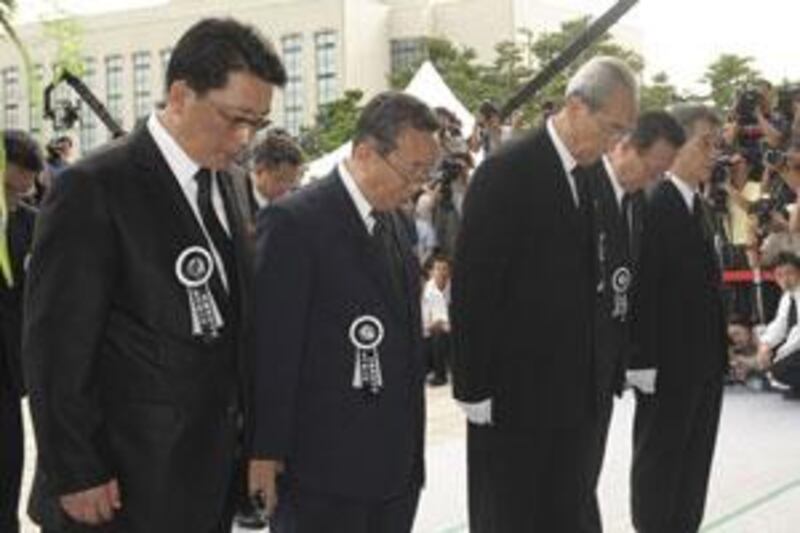BEIJING // North Korea's recent "charm offensive", which includes an invitation for a US special envoy to visit the isolated nation, is aimed at improving relations with the US and warrants engagement from the international community, analysts said.
North Korea has invited Stephen Bosworth, Mr Obama's front man on the communist state, to visit Pyongyang for talks on ending the nuclear stand-off, South Korean media reports said yesterday. Citing a diplomatic source in Washington, South Korea's JoongAng Ilbo newspaper said Mr Bosworth would probably visit South Korea, China and Japan in early September "to explain the situation ? and then go to Pyongyang".
A South Korean diplomatic source, speaking on condition of anonymity, said it was not certain whether the envoy's visit to Pyongyang would be made next month. Mr Bosworth has said on a number of occasions he would be willing to visit North Korea. Pyongyang has recently made a number of conciliatory overtures. It welcomed former President Bill Clinton to the country and released two jailed American reporters while he was there. Shortly thereafter, it freed a South Korean citizen held for four months.
North Korea's UN mission envoys also said their nation "is prepared to have dialogue with the US" in a meeting with Bill Richardson, the governor of New Mexico, at the governor's mansion in Santa Fe last week. After the death of Kim Dae-jung, the former South Korean president, the North Korean leader Kim Jong Il swiftly dispatched a high-level delegation to pay respects to the late president ahead of other nations' delegates. It was the first time the North had sent officials to mourn a South Korean president.
Analysts say North Korea is making a tangible shift of policy from hardline to negotiation. "Since mid-July Pyongyang has been using all available channels to indicate its willingness to talk. Obviously, they decided that they have escalated tensions high enough, so it's time to start looking for negotiations," said Andrei Lankov, a North Korea expert at Kookmin University in Seoul. China is said to be behind Pyongyang's invitation of Mr Bosworth, the latest overture. The Chinese vice foreign minister Wu Dawei, who is also Beijing's nuclear envoy, visited Pyongyang last week.
"My understanding is that Wu played a brokering role," said Kim Yong-hyon, a professor of North Korean Studies at Dongguk University in Seoul. North Korea's tension-thawing gestures are primarily aimed at the US, and it also sees the current regional political situation as a prime opportunity to do so. "As Obama's North Korean policy team is getting in shape, North Korea wants to directly talk with the US to assuage its perceived security concerns and relieve diplomatic isolation," said Liu Jiangyong, a security expert at Tsinghua University in Beijing.
In response, the attitudes of the US and South Korea have also become more flexible. Besides the latest development of Mr Bosworth's expected visit to Pyongyang, South Korea also granted a meeting of North Korean funeral delegates to see President Lee Myung-bak, after some hesitance. "North Korea has been so far successful with its peace overture," Mr Liu said. He added that Pyongyang's conciliatory gesture is also timed to coincide with Japan's election period, in the hope Japan might also take a more accommodating posture towards the North.
North Korea yesterday also agreed to a South Korean offer to hold Red Cross talks to organise a new round of reunions of families separated by the Korean war. Prof Kim of Dongguk University sees Pyongyang's gesture of improving ties with the South as ultimately aimed at mollifying the US. "North Korea sees that the US would not improve its relationship with it unless the North first improves its relationship with South Korea - a key US ally," he said.
Analysts believe Kim Jong Il's health, which has been more stable lately, is also playing a role in the push for improving relations with the international community as he wants to hand over a more stable country to his young heir, the third son. The focus of attention now is how the US will respond to Pyongyang's moves. Mr Lankov calls for a cautious approach. "Negotiation is a good idea, but one should not forget that the recent crisis was entirely provoked by North Korea, whose leaders obviously hope to get more aid and more political concessions from the US, South Korea and the outside world," he said.
The Obama administration, however, will not be able to abandon sanctions and enter dialogue mode overnight because of the negative public opinion in the US towards the North following Pyongyang's missile and nuclear launches, analysts said. "Obama cannot move so quickly. There are also different schools of thought within the US administration on how to deal with North Korea. So, North Korea should give Obama some time to sort things out," Mr Liu said.
But Mr Liu believes the current US policy of engaging bilaterally with Pyongyang only within the framework of six-party talks is flawed because it is likely to prolong the current stalemate. "Our aim should [be to] prevent another North Korean nuclear test and ultimately persuade it to give up its entire nuclear programme. If we don't engage them, they will continue with their nuclear programmes," Mr Liu said. "So America shouldn't waste time." foreign.desk@thenational.ae





